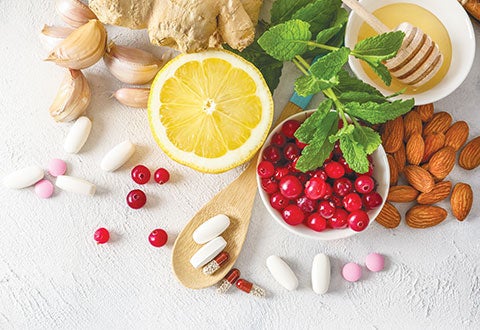National Heart Centre Singapore will NEVER ask you to transfer money over a call. If in doubt, call the 24/7 ScamShield helpline at 1799, or visit the ScamShield website at www.scamshield.gov.sg.
What You Eat Can Affect Your Medication

For patients with heart conditions, it is not uncommon that they have to consume one or more types of medications. Will the food we eat, be it heart healthy or not, affect the medications we take in the body?
Ms Tan Ching Rui, Pharmacist, said that a drug-food interaction may occur when the food we consume interacts with the drugs we take.
Besides food, drinks and herbal remedies may also contribute to such interactions. Certain interactions may reduce the effectiveness of medications, or even accentuate their side effects. Hence, it is paramount for heart patients to have a clear understanding of these interactions can help avoid common pitfalls.
Interactions between Food, Drinks, Herbal Remedies and Common Heart Medications
The following are some common examples:
Statin and Grapefruit | Statin is a commonly used cholesterol medication. Some compounds in grapefruit and grapefruit juice can slow down the breakdown of statin, leading to higher amounts of statin in the body if consumed in large amounts. This can increase the risk of side effects such as muscle aches and liver abnormalities, hence it is advisable to avoid grapefruit and grapefruit juice as much as possible while on statin. |
Warfarin and Vitamin K | Vitamin K is crucial for forming blood clots and preventing bleeding. When taken together with warfarin, it can counteract the blood thinning effect of warfarin and prevent warfarin from working well. Therefore, when on warfarin, it is important to maintain a consistent intake of vitamin K in your diet. Avoid drastic changes in diet especially for vitamin K rich food such as broccoli, brussel sprouts, kailan, |
Direct Oral Anticoagulants [DOACs] (e.g. Rivaroxaban, Apixaban, Dabigatran)
| DOACs are blood thinning medications that are commonly used for stroke prevention in patients with irregular heartbeat. While DOAC boasts significantly less drug-food interaction compared to traditional blood thinner warfarin, caution should still be taken when consuming DOACs with herbal remedies such as ginkgo biloba, garlic, ginger tea and ginseng products. Although the amounts typically found in food would not cause significant interaction, the concentrated amount found in herbal supplements may pose substantial bleeding risk and should be used with caution. In addition, use of DOACs with St John’s wort should be avoided due to significant reduction in the effectiveness of DOACs. |
Angiotensin Converting Enzyme Inhibitors [ACEi] (e.g. Lisinopril, Enalapril, Perindopril) or Angiotensin Receptor Blockers [ARB] (e.g. Losartan, Valsartan) and Potassium Rich Food | Potassium is a mineral that is involved in heart function, muscle contraction and water balance. It is important to keep the right balance of potassium in the body to avoid harmful effects such as irregular heartbeat and muscle weakness or cramping. Blood pressure medications such as ACEi and ARB raise potassium levels, and when coupled with excessive intake of high potassium food, can contribute to elevated potassium levels in the body. Hence, while on ACEi or ARB, avoid eating large amounts of food high in potassium such as bananas, avocado, mango, kiwi, prunes, broccoli, kailan, spinach, sweet potato, potato and seaweed. Sodium salt substitutes are often high in potassium content and should be avoided as well. You may check with your doctor if you would like to consume these products. It is especially important for you to avoid the excessive intake of high potassium food if you are also given concurrent potassium replacement tablet by your doctor. |
The above list is non-exhaustive. Please clarify with your doctor or pharmacist when in doubt.
Supplements with Potential Benefits in Patients with Heart Disease
In the market, there are many supplements that claim to improve heart health. However, unlike prescription medications, evidence surrounding supplements is often sparse. This is further complicated by the fact that not all supplements are made equal. Different brands may contain different amounts of active ingredients, leading to varied safety and effectiveness. Some supplements may even interact with medications. When starting any new supplement, it is always advisable to first speak with your doctor or pharmacist. The following are some supplements that might have potential benefits for the heart:
Omega-3 Fatty Acids
Omega-3 fatty acids, at relatively high doses of 2 to 4 grams per day, have been shown to reduce triglyceride, a type of fat found in the blood. Theoretically, lower triglyceride levels in the body will reduce risk of heart attack, stroke and death due to heart condition. While omega-3 fatty acids appear to be generally safe, it may cause some gastric disturbance and slight increase in bleeding risk. Therefore, if there is no compelling reason to take omega-3 fatty acids supplements, it would be preferable to obtain omega-3 fatty acids from a food source instead. The American Heart Association (AHA) recommends eating fish (particularly fatty fish such as mackerel, sardines, tuna and salmon) at least two times a week.
Coenzyme Q10
Coenzyme Q10 may potentially help to reduce muscle symptoms associated with statin use, as well as improve symptoms of heart failure. However, to date, evidence for use has been conflicting. Although the findings are mixed, given the lack of significant side effects and plausible benefit, trial of Coenzyme Q10 is reasonable if desired.
Red Yeast Rice
Red yeast rice contains an ingredient called monacolins, which helps to lower total cholesterol and bad cholesterol known as LDL. It works in a similar manner as the cholesterol medication statin and thus they should not be taken together. Red yeast rice also causes similar side effects as statin such as muscle pain. Do note that the efficacy and safety differ between products due to varying concentration of monacolins.
This article is from Murmurs Issue 42 (January – April 2022). Click here to read other articles or issues.
© 2025 SingHealth Group. All Rights Reserved.

















